2024届高考英语之动词课件(共39张PPT)
文档属性
| 名称 | 2024届高考英语之动词课件(共39张PPT) |  | |
| 格式 | pptx | ||
| 文件大小 | 1.8MB | ||
| 资源类型 | 教案 | ||
| 版本资源 | 通用版 | ||
| 科目 | 英语 | ||
| 更新时间 | 2023-08-24 15:43:01 | ||
图片预览

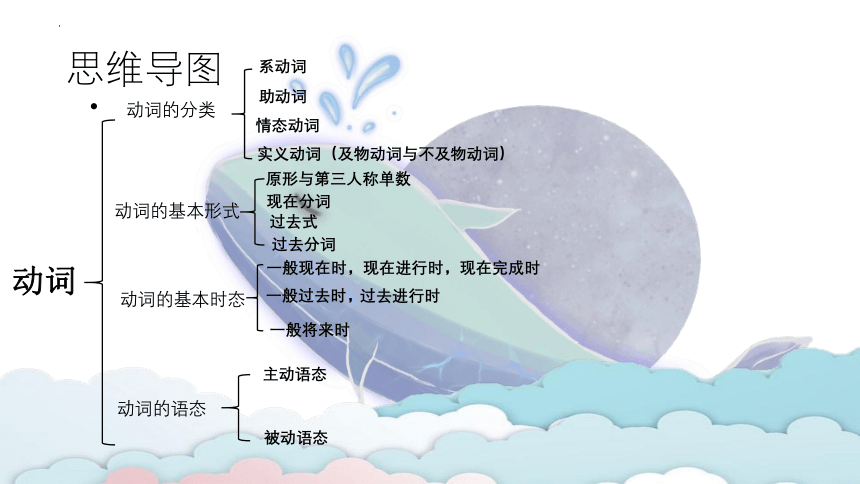
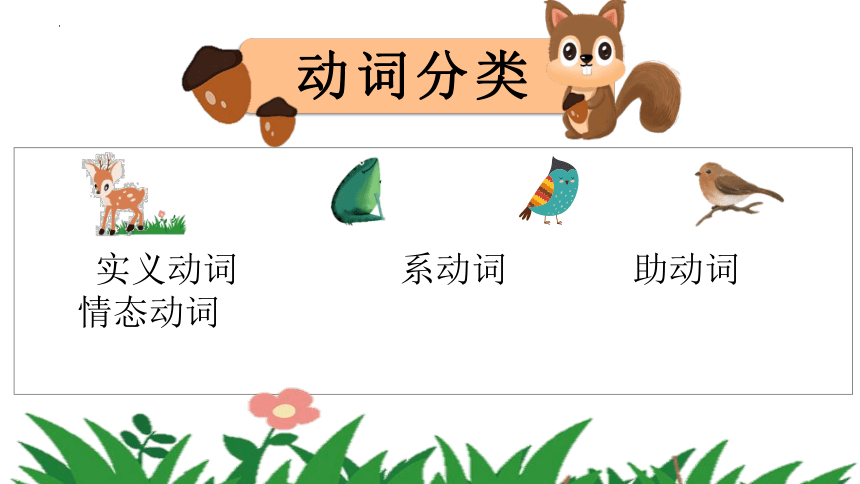
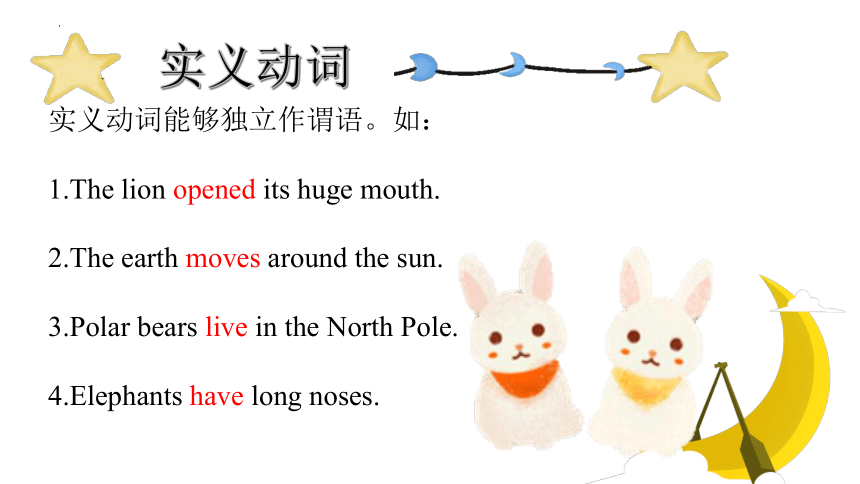
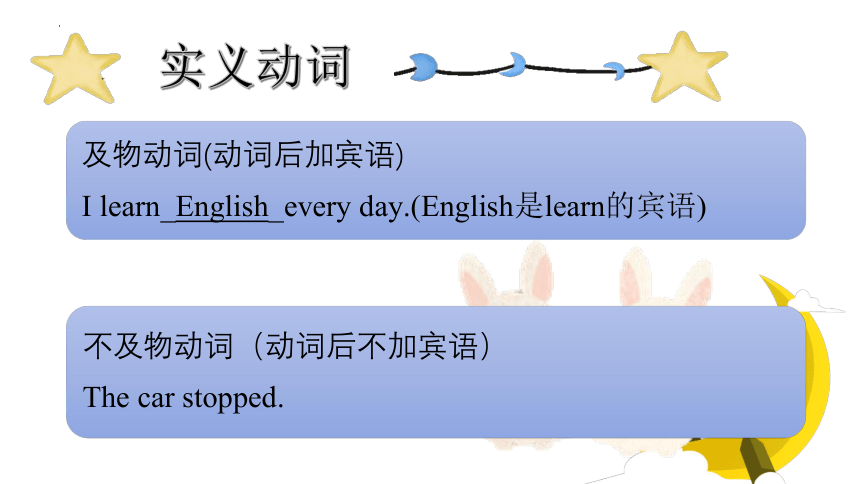
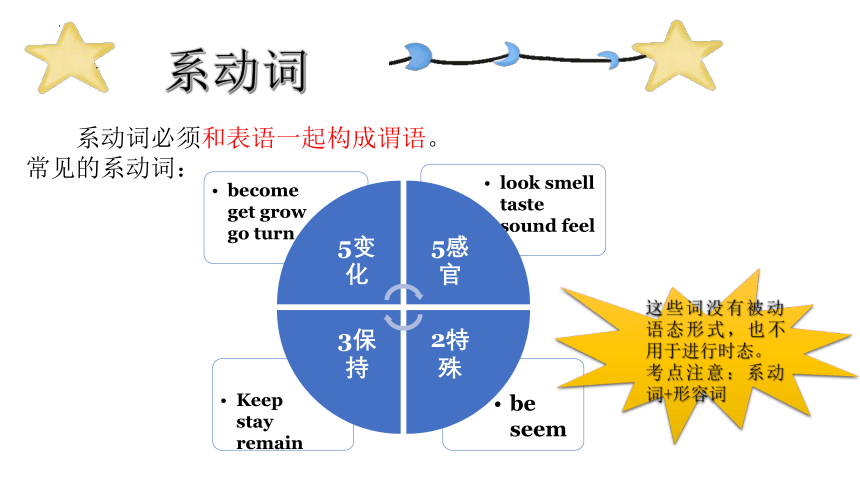
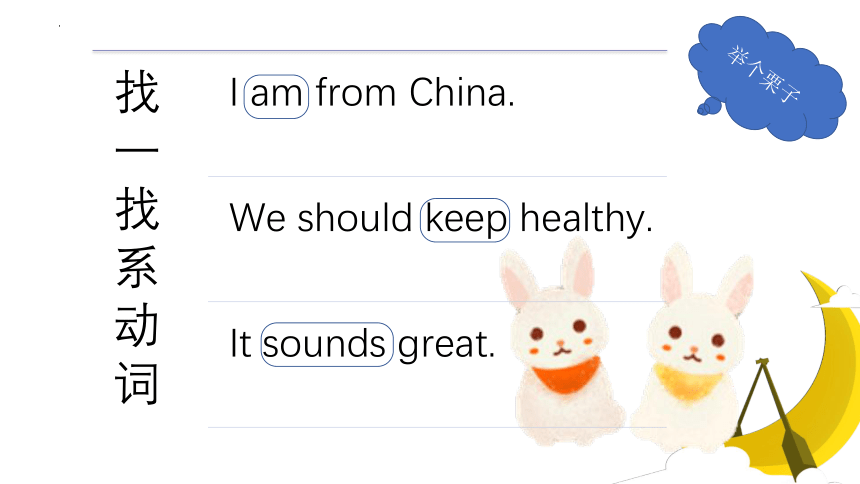
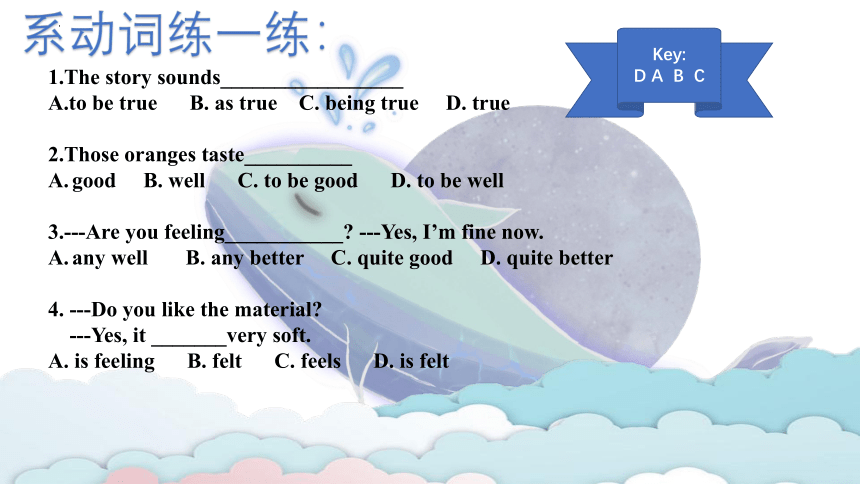
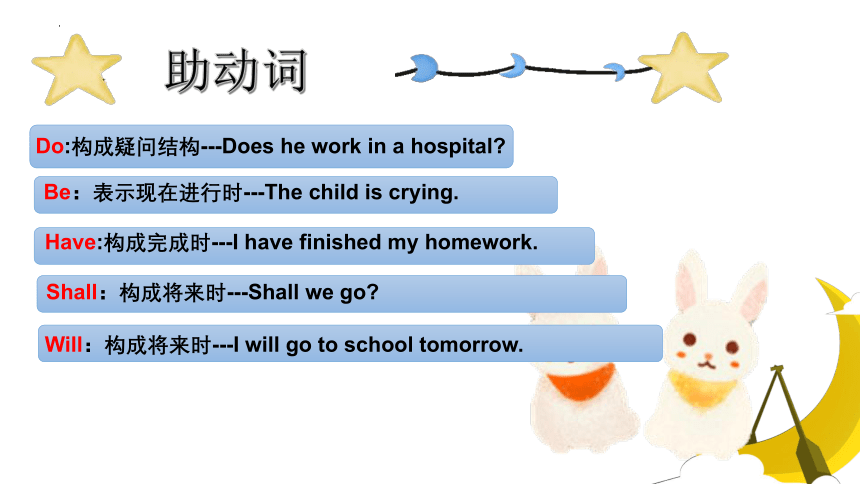
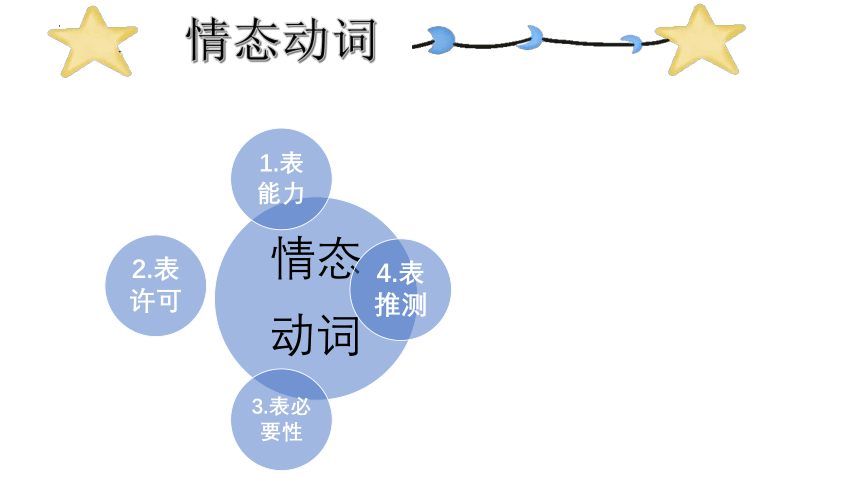

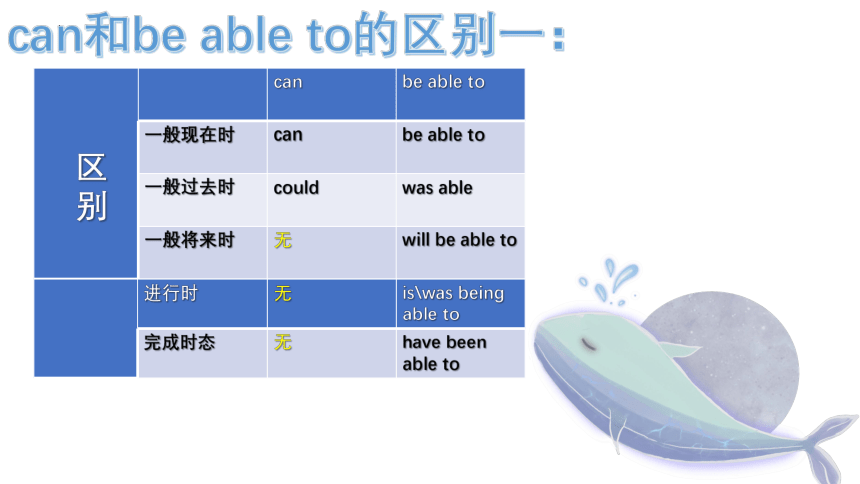
文档简介
(共39张PPT)
第三讲、动词
1.动词的分类
2.动词的时态
思维导图
原形与第三人称单数
动词的分类
动词的基本形式
动词的基本时态
动词的语态
系动词
助动词
情态动词
实义动词(及物动词与不及物动词)
现在分词
过去式
过去分词
一般现在时,现在进行时,现在完成时
一般过去时,
过去进行时
一般将来时
主动语态
被动语态
动词
动词分类
实义动词 系动词 助动词 情态动词
实义动词能够独立作谓语。如:
1.The lion opened its huge mouth.
2.The earth moves around the sun.
3.Polar bears live in the North Pole.
4.Elephants have long noses.
实义动词
实义动词
系动词必须和表语一起构成谓语。
常见的系动词:
系动词
这些词没有被动语态形式,也不用于进行时态。
考点注意:系动词+形容词
举个栗子
系动词练一练:
1.The story sounds_________________
A.to be true B. as true C. being true D. true
2.Those oranges taste__________
good B. well C. to be good D. to be well
3.---Are you feeling___________ ---Yes, I’m fine now.
any well B. any better C. quite good D. quite better
4. ---Do you like the material
---Yes, it _______very soft.
A. is feeling B. felt C. feels D. is felt
Key:
D A B C
助动词
Do:构成疑问结构---Does he work in a hospital
Be:表示现在进行时---The child is crying.
Have:构成完成时---I have finished my homework.
Will:构成将来时---I will go to school tomorrow.
Shall:构成将来时---Shall we go
情态动词
1.can,could:
1.表示能力:
I can swim.
I could swim two years ago.
2.表示请求和允许(可与may 互换)
Can I go now
Could I come to see you
区 别 can be able to
一般现在时 can be able to
一般过去时 could was able
一般将来时 无 will be able to
进行时 无 is\was being able to
完成时态 无 have been able to
can和be able to的区别一:
can和be able to的区别二:
1.be able to 表示通过努力而会的的能力:
She will be able to sing the song in English in a few minutes .
2.can强调自身已经具有的能力
She can sing the song in English.
2.may,might:
表示请求和允许(可以与can互换)
--May I smoke in this room
--Yes, you may.
--No, you can’t /mustn’t.
3.must:
表示必须,必要。说话人的主观看法。
You must come in time.
--Must I finish my homework today
--Yes, you must.
--No, you needn’t / you don’t have to.
情态动词表推测:
must>should/ought to>can/could>may/might
He might be very busy.
He may be very busy.
He must be very busy.
must
might\may
should\ought to
can\could
4.need
1).表示需要做…
need to do
2).needn’t 不必
You needn’t worry about it.
5.shall, should
1.shall用于第一人称,征求对方意见。
e.g. Shall I clean the room now
2.Should表示应该做…。
e.g. You shouldn’t watch TV every day.
According to the traffic law , children under 12____ ride bicycle on the road.
won’t B. wouldn’t C. needn’t D. mustn’t
解析:由题意可知,该题旨在阐述一件法律禁止的事情—12岁以下的儿童禁止在马路上骑车,四个选项中只有mustn’t表示禁止,故选D.
2.Must I finish my task today
--No, you ___. Just in three days.
can’t B. don’t have to C. mustn’t D. may not
解析:由题意可知,这里的must表示必须,由回答可知,这里指的是没有必要,A选项是不能,不可能,B选项是没有必要。C选项是禁止,D选项表示微程度的否定推测,故选B。
1.表能力:can/could 能够
2.表请求,允许: can/could ; may 可以
3.表要求,命令:should
5.表必须,需要: must need
4.表推测: can 可能 may /might可能 must 一定
情态动词总结:
情态动词
分类
情态动词练一练:
1.John_ _ _ come to see us tonight, but he isn't very sure yet.
may B. can C. has to D. must
2.They _ _ _ do well in the exam.
can be able to B. be able to C. can able to D. are able to
3. - May I take this book out
-No, you_ _ _.
A. can’t B. may not C. needn’t D. aren’t
4. You_ _ _ go and see a doctor at once because you're got a fever.
can B. must C. dare D. would.
5.- -Can you speak Japanese - -No, I_ _ _.
mustn’t B. can’t C. needn’t D. may not
Key:
A D A B B
考察内容
动词时态分类
考点
动词
谓语
非谓语
词性转换
考点1 谓语动词
时态
语态
数
一句话中如果没有连词,有且只有一个谓语动词。
谓语动词有be动词,实义动词V.(V原,第三人称单数V-s/V-es,过去式V-ed)
过去分词done, be动词的过去分词been
I am a girl.
I love playing football.
谓语动词
被动语态be+done
时间(过去、现在、将来)+状态(一般、进行、完成)
My name is Li Xiaoyin. I started teaching English in 2018 and I will continue teaching English in the future. I am teaching grammar at this moment. A few days ago, you knew that we had learned English adjective and adverb. So far, we have finished learning 6 types of tense(时态).
主动 被动
一般现在时
一般过去时
一般将来时
正在进行时
现在完成时
过去完成时
am/is/are/V原/V-es
was/were/V-ed
was/were+done
will+V原
will+be done
am/is/are+V-ing
am/is/are+being done
have/has+done
have/has+been done
had done
had+ been done
am/is/are+done
请找出上述段落中共出现了几种时态?
时态 现在 过去 将来 过去将来
一般 一般现在 一般过去 一般将来 过去将来
进行 现在进行 过去进行 将来进行 过去将来进行
完成 现在完成 过去完成 将来完成 过去将来完成
完成进行 现在完成进行 过去完成进行 将来完成进行 过去将来完成进行时
动词时态(16种)
(1)一般现在时
am/is/are/V原/V-es
am/is/are+done(被动语态)
用法:
①习惯性经常性发生的动作
Tom goes to school by bike every day.汤姆每天骑自行车上学。
②客观事实/普遍真理
The sun goes around the earth.太阳绕着地球转。
③描述主语的状态(性格、特征、能力)
My name is XXX.
标志词:
often经常;usually通常;always总是;sometimes有时;every day/week每天/每周
过去
现在
将来
(2)一般过去时
was/were/V-ed
was/were+done(被动语态)
用法:
过去某个特定时间内发生的动作。
She suddenly fell ill yesterday.她昨天突然生病了。
标志词:
yesterday昨天;ago以前;last week上周;at that time; just now
过去
现在
将来
1.构成:
① be going to + v.原 →表示计划做某事/有迹象要发生某事
②will + v.原
③shall + v.原→表请求,询问意见
2.用法:表示在将来某个时间将要发生的动作或存在的状态
3.标志词:tomorrow,next month,in two days,soon,
the day after tomorrow(后天),
4.例句:We will join in a party tomorrow.
Shall we go to beijing tomorrow?
过去
现在
将来
补:①常用这种结构的动词有 go, come, leave, stay, start , begin 等。
表即将发生或安排好要做的事。延续动词跟非延续动词
We are leaving for London.现在进行时表示将来时
② be about to+ v. 原
=be going to
③be to+ v. 原, 都表将来,“ 马上做某事”
The train is about to start.
She is to be married next month.
will+be done(被动语态)
(3)一般将来时
(4)正在进行时
am/is/are+V-ing
am/is/are+being done(被动语态)
用法:
①此时此刻正在进行的动作。
We are having English class now.我们正在上英语课。
标志词:
now现在;at this moment/time在此时/此刻;listen/look; right now; a t present目前
②现阶段正在进行的动作或存在的状态。
We are reviewing grammar these days.我们这些天一直都在复习语法。
(5) 过去进行时
1.构成:was/were+doing
2.用法:①表示过去某时或某段时间正在发生的动作,
②常与从句等特定的过去时间连用。
3.标志词:this morning, the whole morning, all day yesterday,
4.例句:
They were watching TV at this time last night. 昨晚这个时候他们正在看电视。
过去
现在
将来
新疆
2004
2021
I have lived in Xinjiang for 18 years.
I have spent all of money so far.
①过去发生的动作持续到现在并且有可能继续持续下去;
②过去发生的动作对现在造成一定的影响;
标志词:①since(自从)②so far/up to now(到目前为止)③recently/lately(最近)④in/over the past few years(在过去的几年里)⑤already(已经)⑥yet(仍,还)⑦for+一段时间
(6)现在完成时
have/has+done
have/has+been done被动语态
用法:
1.结构:主语+had done
2.用法:①一件事情发生在过去,而另一件事先于它发生(表“过去的过去”)发生在前的事情的动词用过去完成。
I had learnt) learn 5000 words before I entered the university. 2015
②表示从过去某一时间开始,一直延续到过去的另一时间的动作,常用的时间状语有:until/ by/ before/ by the end of +“表过去的某一时间”。
By the end of last year we had built five new houses.
过去
现在
将来
√
(7)过去完成时
had+ been done(被动语态)
(8)过去将来时
1.结构:主语+would/was(were)going to+V原……
2.用法:从过去某一段时间看将来发生的动作或存在的状态,常用于宾从中
He said that he would buy some fruit for his sister.他说他将会买一些水果给他姐姐。
过去
现在
将来
Ⅰ. 用所给词的适当形式填空
1.I’m sorry that I didn’t answer your phone. I _______ (listen) to music and didn’t hear the ring.
2. Mr. Liu isn’t here now. He _______ (go) to Beijing.
3. My mother often _______ (enjoy) the TV plays in the evening.
4. We know each other well because we _______ (be) friends since ten years ago.
5. I _______ (visit) my aunt on the farm last weekend.
练一练
答案:1. was listening 2. has gone 3. enjoys 4. have been 5. visited
Ⅱ. 单项选择
1. —I called you last night, but you didn’t answer it. —I’m terribly sorry. I _______ a meeting at that time.
A. had B. was having C. am having
【解析】选B。由at that time可知过去打电话这一动作发生的时候开会这一动作正在发生,故选B。
2. This silk dress _______ so smooth. It’s made in China.
A. feels B. smells C. sounds D. tastes
【解析】选A。句意:这件丝绸的衣服摸起来这么光滑。它是中国制造的。feel“摸起来”;smell“闻起来”; sound“听起来”; taste“尝起来”。故选A。
3. —Where is Mr Black I have something important to tell him. —You can’t find him. He _______ Hong Kong.
A. will go to B. would go to
C. has gone to D. has been to
【解析】选C。由“你找不到他。”可知他去香港了,还没回来,故选C。
4. —Have you ever been to Shanghai
—Yes. I _______ there a few months ago.
A. have been B. went C. have gone
【解析】选B。由时间状语a few months ago“几个月前”可知时态为一般过去时,故答案为B。
5. Chen Guangbiao says he _______ all his money to charities when he dies.
A. leaves B. left
C. will leave D. would leave
【解析】选C。when引导的时间状语从句用一般现在时,主句多用将来时。
6. There _______ an English party in our school tomorrow evening.
A. have B. will have
C. is going to have D. will be
【解析】选D。由时间状语tomorrow evening可知时态为一般将来时,there be结构的将来时为there will be/there is going to be。故选D。
7. —Hello, may I speak to Zhang Jun
—Oh, sorry! He _______ to Guiyang.
A. has been B. has gone C. went
【解析】选B。由句意可知张军去贵阳还没回来,故用has gone to。
8. I _______ my hometown for a long time. I really miss it!
A. left B. went away from
C. have left D. have been away from
【解析】选D。根据句意“我离开家乡很长时间了。我真的想念它!”可知用现在完成时,排除A与B。由时间状语“for a long time”可知,此处应该使用延续性动词,排除C。故选D。
9. There _______ some flowers on the teacher’s desk just now, but now there _______ nothing on it.
A. have; has B. were; was
C. were; is D. has; has
【解析】选B。there be结构谓语动词为be动词。由just now可知时态为一般过去时, 由now可知时态为一般现在时,故选B。
翻译句子。
1.一个音乐节将于11月18日在学校大厅被举办。(hold-held-held)举办
2.讲座将于8点开始,持续2小时。(last持续)
3.上周星期天晚上,我们有一个不错的班会。
4.去年夏天,我的家人和我有一个难忘的北京之旅。
(a trip to ..........的旅行)
5.到目前为止,汤姆已经写了一封信。
Homework:
1.维词20个
2.整理本堂课笔记
第三讲、动词
1.动词的分类
2.动词的时态
思维导图
原形与第三人称单数
动词的分类
动词的基本形式
动词的基本时态
动词的语态
系动词
助动词
情态动词
实义动词(及物动词与不及物动词)
现在分词
过去式
过去分词
一般现在时,现在进行时,现在完成时
一般过去时,
过去进行时
一般将来时
主动语态
被动语态
动词
动词分类
实义动词 系动词 助动词 情态动词
实义动词能够独立作谓语。如:
1.The lion opened its huge mouth.
2.The earth moves around the sun.
3.Polar bears live in the North Pole.
4.Elephants have long noses.
实义动词
实义动词
系动词必须和表语一起构成谓语。
常见的系动词:
系动词
这些词没有被动语态形式,也不用于进行时态。
考点注意:系动词+形容词
举个栗子
系动词练一练:
1.The story sounds_________________
A.to be true B. as true C. being true D. true
2.Those oranges taste__________
good B. well C. to be good D. to be well
3.---Are you feeling___________ ---Yes, I’m fine now.
any well B. any better C. quite good D. quite better
4. ---Do you like the material
---Yes, it _______very soft.
A. is feeling B. felt C. feels D. is felt
Key:
D A B C
助动词
Do:构成疑问结构---Does he work in a hospital
Be:表示现在进行时---The child is crying.
Have:构成完成时---I have finished my homework.
Will:构成将来时---I will go to school tomorrow.
Shall:构成将来时---Shall we go
情态动词
1.can,could:
1.表示能力:
I can swim.
I could swim two years ago.
2.表示请求和允许(可与may 互换)
Can I go now
Could I come to see you
区 别 can be able to
一般现在时 can be able to
一般过去时 could was able
一般将来时 无 will be able to
进行时 无 is\was being able to
完成时态 无 have been able to
can和be able to的区别一:
can和be able to的区别二:
1.be able to 表示通过努力而会的的能力:
She will be able to sing the song in English in a few minutes .
2.can强调自身已经具有的能力
She can sing the song in English.
2.may,might:
表示请求和允许(可以与can互换)
--May I smoke in this room
--Yes, you may.
--No, you can’t /mustn’t.
3.must:
表示必须,必要。说话人的主观看法。
You must come in time.
--Must I finish my homework today
--Yes, you must.
--No, you needn’t / you don’t have to.
情态动词表推测:
must>should/ought to>can/could>may/might
He might be very busy.
He may be very busy.
He must be very busy.
must
might\may
should\ought to
can\could
4.need
1).表示需要做…
need to do
2).needn’t 不必
You needn’t worry about it.
5.shall, should
1.shall用于第一人称,征求对方意见。
e.g. Shall I clean the room now
2.Should表示应该做…。
e.g. You shouldn’t watch TV every day.
According to the traffic law , children under 12____ ride bicycle on the road.
won’t B. wouldn’t C. needn’t D. mustn’t
解析:由题意可知,该题旨在阐述一件法律禁止的事情—12岁以下的儿童禁止在马路上骑车,四个选项中只有mustn’t表示禁止,故选D.
2.Must I finish my task today
--No, you ___. Just in three days.
can’t B. don’t have to C. mustn’t D. may not
解析:由题意可知,这里的must表示必须,由回答可知,这里指的是没有必要,A选项是不能,不可能,B选项是没有必要。C选项是禁止,D选项表示微程度的否定推测,故选B。
1.表能力:can/could 能够
2.表请求,允许: can/could ; may 可以
3.表要求,命令:should
5.表必须,需要: must need
4.表推测: can 可能 may /might可能 must 一定
情态动词总结:
情态动词
分类
情态动词练一练:
1.John_ _ _ come to see us tonight, but he isn't very sure yet.
may B. can C. has to D. must
2.They _ _ _ do well in the exam.
can be able to B. be able to C. can able to D. are able to
3. - May I take this book out
-No, you_ _ _.
A. can’t B. may not C. needn’t D. aren’t
4. You_ _ _ go and see a doctor at once because you're got a fever.
can B. must C. dare D. would.
5.- -Can you speak Japanese - -No, I_ _ _.
mustn’t B. can’t C. needn’t D. may not
Key:
A D A B B
考察内容
动词时态分类
考点
动词
谓语
非谓语
词性转换
考点1 谓语动词
时态
语态
数
一句话中如果没有连词,有且只有一个谓语动词。
谓语动词有be动词,实义动词V.(V原,第三人称单数V-s/V-es,过去式V-ed)
过去分词done, be动词的过去分词been
I am a girl.
I love playing football.
谓语动词
被动语态be+done
时间(过去、现在、将来)+状态(一般、进行、完成)
My name is Li Xiaoyin. I started teaching English in 2018 and I will continue teaching English in the future. I am teaching grammar at this moment. A few days ago, you knew that we had learned English adjective and adverb. So far, we have finished learning 6 types of tense(时态).
主动 被动
一般现在时
一般过去时
一般将来时
正在进行时
现在完成时
过去完成时
am/is/are/V原/V-es
was/were/V-ed
was/were+done
will+V原
will+be done
am/is/are+V-ing
am/is/are+being done
have/has+done
have/has+been done
had done
had+ been done
am/is/are+done
请找出上述段落中共出现了几种时态?
时态 现在 过去 将来 过去将来
一般 一般现在 一般过去 一般将来 过去将来
进行 现在进行 过去进行 将来进行 过去将来进行
完成 现在完成 过去完成 将来完成 过去将来完成
完成进行 现在完成进行 过去完成进行 将来完成进行 过去将来完成进行时
动词时态(16种)
(1)一般现在时
am/is/are/V原/V-es
am/is/are+done(被动语态)
用法:
①习惯性经常性发生的动作
Tom goes to school by bike every day.汤姆每天骑自行车上学。
②客观事实/普遍真理
The sun goes around the earth.太阳绕着地球转。
③描述主语的状态(性格、特征、能力)
My name is XXX.
标志词:
often经常;usually通常;always总是;sometimes有时;every day/week每天/每周
过去
现在
将来
(2)一般过去时
was/were/V-ed
was/were+done(被动语态)
用法:
过去某个特定时间内发生的动作。
She suddenly fell ill yesterday.她昨天突然生病了。
标志词:
yesterday昨天;ago以前;last week上周;at that time; just now
过去
现在
将来
1.构成:
① be going to + v.原 →表示计划做某事/有迹象要发生某事
②will + v.原
③shall + v.原→表请求,询问意见
2.用法:表示在将来某个时间将要发生的动作或存在的状态
3.标志词:tomorrow,next month,in two days,soon,
the day after tomorrow(后天),
4.例句:We will join in a party tomorrow.
Shall we go to beijing tomorrow?
过去
现在
将来
补:①常用这种结构的动词有 go, come, leave, stay, start , begin 等。
表即将发生或安排好要做的事。延续动词跟非延续动词
We are leaving for London.现在进行时表示将来时
② be about to+ v. 原
=be going to
③be to+ v. 原, 都表将来,“ 马上做某事”
The train is about to start.
She is to be married next month.
will+be done(被动语态)
(3)一般将来时
(4)正在进行时
am/is/are+V-ing
am/is/are+being done(被动语态)
用法:
①此时此刻正在进行的动作。
We are having English class now.我们正在上英语课。
标志词:
now现在;at this moment/time在此时/此刻;listen/look; right now; a t present目前
②现阶段正在进行的动作或存在的状态。
We are reviewing grammar these days.我们这些天一直都在复习语法。
(5) 过去进行时
1.构成:was/were+doing
2.用法:①表示过去某时或某段时间正在发生的动作,
②常与从句等特定的过去时间连用。
3.标志词:this morning, the whole morning, all day yesterday,
4.例句:
They were watching TV at this time last night. 昨晚这个时候他们正在看电视。
过去
现在
将来
新疆
2004
2021
I have lived in Xinjiang for 18 years.
I have spent all of money so far.
①过去发生的动作持续到现在并且有可能继续持续下去;
②过去发生的动作对现在造成一定的影响;
标志词:①since(自从)②so far/up to now(到目前为止)③recently/lately(最近)④in/over the past few years(在过去的几年里)⑤already(已经)⑥yet(仍,还)⑦for+一段时间
(6)现在完成时
have/has+done
have/has+been done被动语态
用法:
1.结构:主语+had done
2.用法:①一件事情发生在过去,而另一件事先于它发生(表“过去的过去”)发生在前的事情的动词用过去完成。
I had learnt) learn 5000 words before I entered the university. 2015
②表示从过去某一时间开始,一直延续到过去的另一时间的动作,常用的时间状语有:until/ by/ before/ by the end of +“表过去的某一时间”。
By the end of last year we had built five new houses.
过去
现在
将来
√
(7)过去完成时
had+ been done(被动语态)
(8)过去将来时
1.结构:主语+would/was(were)going to+V原……
2.用法:从过去某一段时间看将来发生的动作或存在的状态,常用于宾从中
He said that he would buy some fruit for his sister.他说他将会买一些水果给他姐姐。
过去
现在
将来
Ⅰ. 用所给词的适当形式填空
1.I’m sorry that I didn’t answer your phone. I _______ (listen) to music and didn’t hear the ring.
2. Mr. Liu isn’t here now. He _______ (go) to Beijing.
3. My mother often _______ (enjoy) the TV plays in the evening.
4. We know each other well because we _______ (be) friends since ten years ago.
5. I _______ (visit) my aunt on the farm last weekend.
练一练
答案:1. was listening 2. has gone 3. enjoys 4. have been 5. visited
Ⅱ. 单项选择
1. —I called you last night, but you didn’t answer it. —I’m terribly sorry. I _______ a meeting at that time.
A. had B. was having C. am having
【解析】选B。由at that time可知过去打电话这一动作发生的时候开会这一动作正在发生,故选B。
2. This silk dress _______ so smooth. It’s made in China.
A. feels B. smells C. sounds D. tastes
【解析】选A。句意:这件丝绸的衣服摸起来这么光滑。它是中国制造的。feel“摸起来”;smell“闻起来”; sound“听起来”; taste“尝起来”。故选A。
3. —Where is Mr Black I have something important to tell him. —You can’t find him. He _______ Hong Kong.
A. will go to B. would go to
C. has gone to D. has been to
【解析】选C。由“你找不到他。”可知他去香港了,还没回来,故选C。
4. —Have you ever been to Shanghai
—Yes. I _______ there a few months ago.
A. have been B. went C. have gone
【解析】选B。由时间状语a few months ago“几个月前”可知时态为一般过去时,故答案为B。
5. Chen Guangbiao says he _______ all his money to charities when he dies.
A. leaves B. left
C. will leave D. would leave
【解析】选C。when引导的时间状语从句用一般现在时,主句多用将来时。
6. There _______ an English party in our school tomorrow evening.
A. have B. will have
C. is going to have D. will be
【解析】选D。由时间状语tomorrow evening可知时态为一般将来时,there be结构的将来时为there will be/there is going to be。故选D。
7. —Hello, may I speak to Zhang Jun
—Oh, sorry! He _______ to Guiyang.
A. has been B. has gone C. went
【解析】选B。由句意可知张军去贵阳还没回来,故用has gone to。
8. I _______ my hometown for a long time. I really miss it!
A. left B. went away from
C. have left D. have been away from
【解析】选D。根据句意“我离开家乡很长时间了。我真的想念它!”可知用现在完成时,排除A与B。由时间状语“for a long time”可知,此处应该使用延续性动词,排除C。故选D。
9. There _______ some flowers on the teacher’s desk just now, but now there _______ nothing on it.
A. have; has B. were; was
C. were; is D. has; has
【解析】选B。there be结构谓语动词为be动词。由just now可知时态为一般过去时, 由now可知时态为一般现在时,故选B。
翻译句子。
1.一个音乐节将于11月18日在学校大厅被举办。(hold-held-held)举办
2.讲座将于8点开始,持续2小时。(last持续)
3.上周星期天晚上,我们有一个不错的班会。
4.去年夏天,我的家人和我有一个难忘的北京之旅。
(a trip to ..........的旅行)
5.到目前为止,汤姆已经写了一封信。
Homework:
1.维词20个
2.整理本堂课笔记
